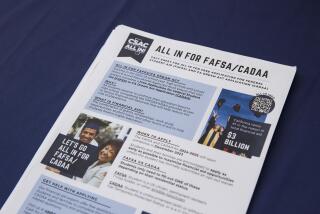UCLA survey finds more freshmen worried about finances
- Share via
Family unemployment and a growing student loan burden are making American college students increasingly anxious about finances, according to a national survey by UCLA researchers.
Nearly 67% of freshmen at four-year colleges and universities said they had at least some concerns about paying their tuition bills, the highest percentage expressing such anxieties in a dozen years, the annual study found. And with unemployment affecting many families, about 53% of freshmen who took part in the survey last fall said they carried student loans, up about 4% from the previous year and the highest in nine years.
“You can see why they are concerned. More of their parents are out of work. More of them are having to take out loans. They weren’t able to find jobs to work before they came to college, and college expenses are going up,” explained John H. Pryor, managing director of UCLA’s Higher Education Research Institute, which conducts the American Freshman survey.
The report, considered the nation’s most comprehensive assessment of college student attitudes, found that 4.5% of the students’ fathers were unemployed, the largest jobless proportion among fathers since the survey began 44 years ago. Nearly 8% of the respondents’ mothers were jobless, the most in 30 years.
The unemployment figures are lower than for the general population because colleges tend to draw from a higher-than-average income demographic, but Pryor said the figures were still significant. The survey also showed that financial aid played an important role in a college choice for nearly 45% of the freshmen, up from about 43% and 39% in the two previous years.
Victor Villanueva, a freshman at UC Santa Barbara, said he knows those pressures firsthand, both from his own situation and from his part-time campus job as a peer counselor on financial aid. The political science major from Los Angeles receives substantial grants and has loans that he expects will total more than $10,000 by graduation.
Although the amount is smaller than that facing many of his friends, Villanueva still worries. “It’s a big amount, it’s a lot of money,” he said. He expects to take on even more debt to attend law school.
At his campus job, he said, he talks to aid applicants who are unable to find jobs on- or off-campus because of budget cuts and the weak economy. And some are seeking emergency help because their parents have lost their jobs and the students are worried about “getting kicked out of their apartments” near school.
Anxiety about the economy appears to be influencing many students’ long-term plans too, Pryor said. How well graduates of their colleges do in landing good jobs was a very important consideration in choosing a school for 56.5% of incoming freshmen, the highest proportion since the survey first asked that question in 1983. And 78% of students reported that being well off financially was an important life goal, the highest since 1966, while the share who placed importance on developing a meaningful philosophy of life fell more than two percentage points to 48%.
On the other hand, the troubles on Wall Street may have affected the students’ choices of majors. The share of freshmen intending to major in a business field dropped from nearly 17% last year to about 14%, the lowest in 35 years.
The experience of starting college during a recession probably won’t match the life-changing hardships that their grandparents may have faced during the Great Depression, Pryor said. But he added, “Certainly there is the potential for this to be an experience that does influence how students behave both in college and after they graduate.”
This year’s survey includes the responses of 219,864 first-year students at 297 colleges and universities around the country.
More to Read
Sign up for Essential California
The most important California stories and recommendations in your inbox every morning.
You may occasionally receive promotional content from the Los Angeles Times.











